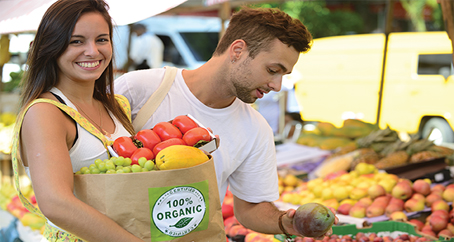Chris Pitsikoulis, in buying and sales for Fruits et Legumes Gaetan Bono, Inc., an importer, exporter, and shipper located in Montreal with a big commitment to organics, says, “Like many of our producers, we believe that within ten years there will be virtually no difference between organic and conventional produce. The difference in cost is becoming narrower and as people demand healthier fruits and vegetables, growers across the board are providing the best, cleanest produce they possibly can.”
David Weinstein of Heath & Lejeune, Inc. in Los Angeles says, “Our company is built on the fact that people want to eat organic produce and are willing to make economic sacrifices to do so. It’s no longer just the realm of healthfood stores. Mainstream retailers such as Walmart, Kroger, and Target are directing their buyers to make a commitment to organics.”
Labeling Confusion Clarified
What’s the difference between products labeled ‘organic’ or ‘natural’? Buyers should be wary of false claims on labels and packaging. Following are several definitions from organic regulators at the U.S. Department of Agriculture (USDA), spelling out what ‘organic,’ ‘natural,’ and ‘sustainable’ mean when found on a certified USDA or National Organic Program label.
• 100 Percent Organic – foods with a single ingredient; includes fruits, vegetables, eggs, and other individual ingredients.
• Organic – packaged foods or foods with more than one ingredient; for this label the ingredients must be 95 to 100 percent organic by weight. The remaining ingredients are not available organically, but have been approved by the USDA’s National Organic Program (NOP).
• Made with Organic Ingredients – foods with more than one ingredient, of which 70 percent or more are organic.
• Contains Organic Ingredients – foods with a total of less than 70 percent organic ingredients.
• Natural, Sustainable, Local, or Pesticide-Free – these terms do not have enforceable standards or definitions and may contain chemical pesticides, fertilizers, or genetically modified organisms.
“The selection of organics at retail is growing,” Honigberg confirms, and more importantly, “when consumers have a choice, they’ll often choose organics.” Sun Belle sells blueberries, raspberries, and cranberries under the organic ‘Green Belle’ label, which she says has experienced major growth over the last five years.
Mark Munger is another supplier who saw the writing on the wall. He is vice president of sales and marketing at 4 Earth Farms, Inc. in Los Angeles, CA, a vertically-integrated grower, shipper, processor, and importer.



